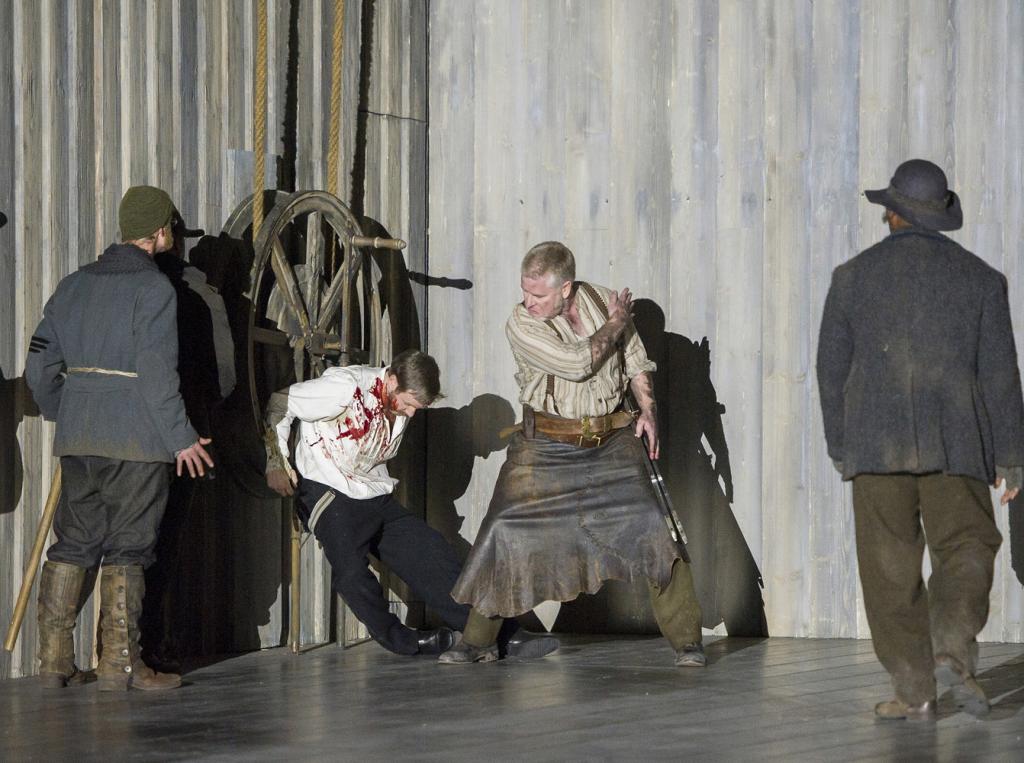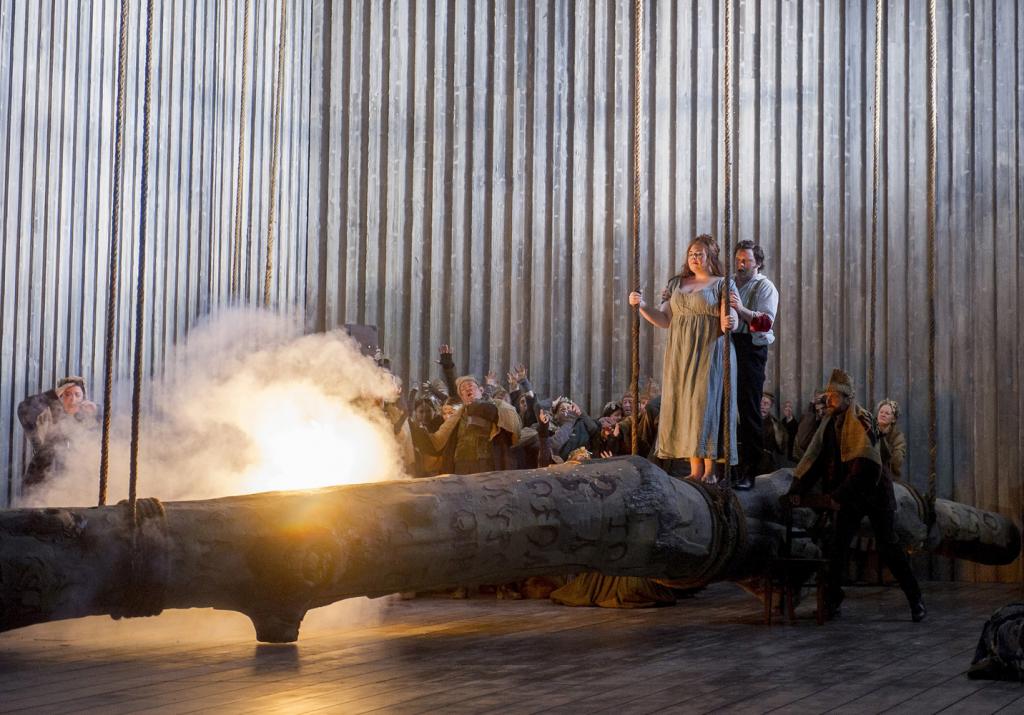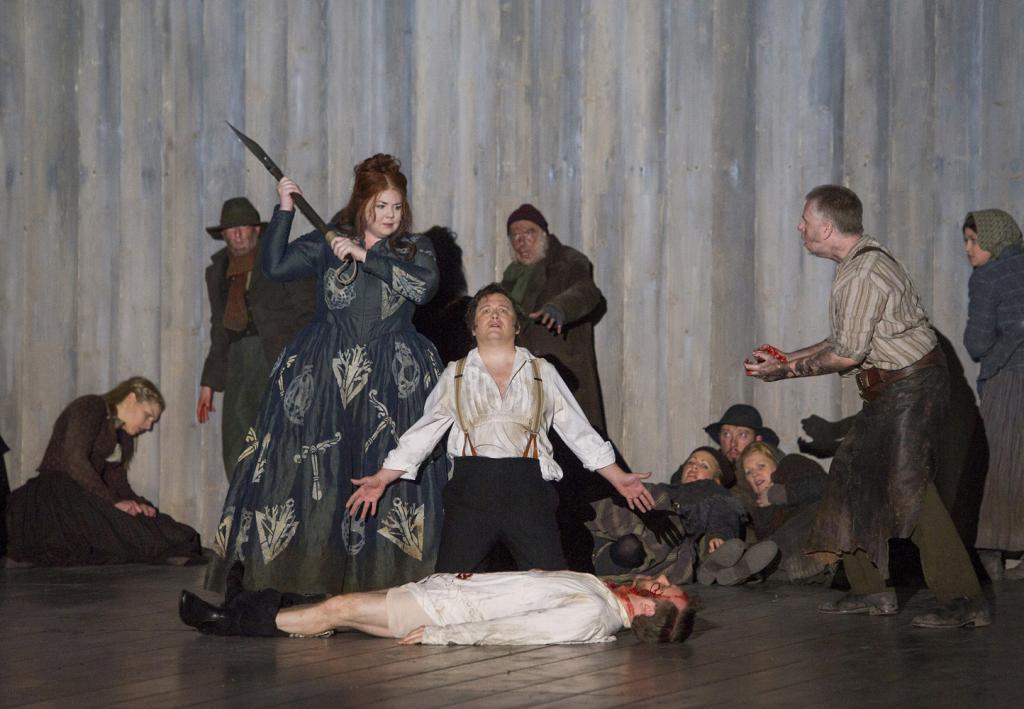This formidable performance of Norma by the English National Opera is a resounding success. Drawing on the ritualistic, otherworldly atmosphere of druidic rites and revealing a tense undercurrent of colonial violence, Christopher Alden’s production displaces Bellini’s struggle between Gauls and Romans to a mid-nineteenth century rural community seemingly threatened by industrialisation. The splendid costumes of Sue Willmington suggest Victorian England as well as the Amish communities of America.
Bellini’s opera offers extremes of love and tragedy, resistance and brutality, madness and self-sacrifice. All the nuances of the characters’ emotions are reflected in the music, sometimes light and lyric, at other times tense and rousing. Norma depicts a community, led by a charismatic Druidess, Norma (wonderfully sung by Marjorie Owens), struggling to maintain its identity under the pressure of an occupation by an unsympathetic external power, represented by a Roman proconsul, Pollione (Peter Auty) and his companion, Flavio (Adrian Dwyer). The uncertain fate of the ‘Gauls’ is paralleled by the internal crisis of their leader, Norma.
In her debut appearance with the ENO, Marjorie Owens’ Norma offers a compelling and complex portrait of a strong leader confronted with a terrible choice; initially, she is torn between the community she sustains and the man she loves. Owens persuasively suggests the conflict of passion versus duty within Norma. Having betrayed her sacred vows and produced two illicit children with Pollione, she must control the rising anger of her people against their occupier without revealing her deceit or her loyalty to the leader of the oppressors. When she learns that Pollione wishes to betray her by eloping with Adalgisa, all hell breaks loose to some very powerful music and the conflict is increased. Owens artfully explores the complex duality of Norma in her stirring performance, offering both righteous anger and guilt-ridden self-reflection.
As her secret lover, Peter Auty presents a powerful, persuasive Pollione. Pollione is consumed by his new passion for the young novice, Adalgisa (mezzo-soprano Jennifer Holloway), and is fearful of Norma’s revenge. The seductive influence that the voice of Auty’s self-assured Roman has over Holloway’s naïve, tormented novice is palpable in the duet between the two in Act I. On occasion Auty’s actions seem to lack the conviction of his voice, never quite demonstrating the depths of his compulsion to love Adalgisa, nor his apprehension of Norma’s reaction.
The depth of expression of the human voice and Bellini’s exquisite music carry this performance between them as was intended by the composer. The famous duets between the two sopranos, Norma, and the young priestess, Adalgisa, are passionate and convincing and a definite highlight of the performance. Holloway’s young Adalgisa has great warmth and presents vocally and dramatically a fine balance to Norma’s rage. These two strong female roles embody the powerful influence of the goddess Irminsul over this pagan community. The compelling chorus of pagan-worshippers is entirely enthralled by Norma, a deep love which finds its equal in their repulsion when they learn of her betrayal.
The striking stage design of Charles Edwards responds to Christopher Alden’s conception by offering a stark contrast to the rich singing. Edwards’s wood-panelled walls successfully project the sound directly into the audience, whilst also focussing attention on the dramatic movements of the cast. The echoing of wood against wood in the hollow space is occasionally distracting but also lends credibility to the intricacies of life in this community under threat. The music and acting are supported by Adam Silverman’s creative lighting design and the conviction of the chorus sustains the illusion of Bellini’s world through sound and gesture.
The formidable finale to Act One sung by Norma, Adalgisa and Pollione and the finale to Act Two both reveal the heights of the control by the main singers over Bellini’s opera at the lowest point of their strength; about to be consumed, by the end, quite literally, by the fire of their passions and the fury of their people. The production is a wonderful introduction to this opera if you have never seen it before; and it is bound to provoke new insights into the work itself if you know it already.




